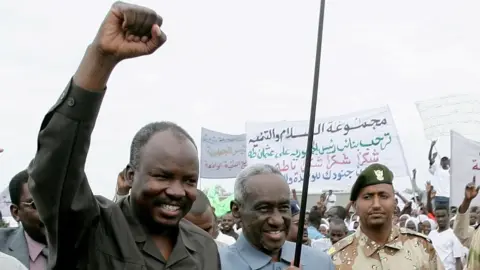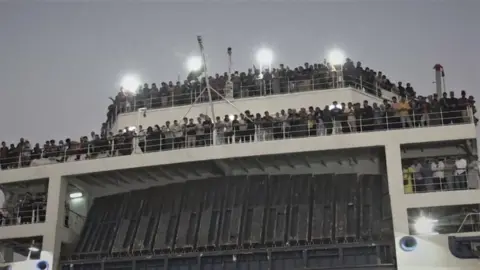Sudan crisis: War crimes suspect free amid chaos
 Getty Images
Getty ImagesA former Sudanese politician wanted for alleged crimes against humanity has said that he and other former officials are no longer in jail - following reports of a break-out.
Ahmed Haroun was among those being held in Kober prison in the capital Khartoum who are facing charges by the International Criminal Court (ICC).
A ceasefire between fighting military factions largely appears to be holding.
But there are doubts about both sides' commitment to a lasting peace.
The conflict - which began on 15 April - arose from a bitter power struggle between the leaders of Sudan's regular army and a rival paramilitary group, the Rapid Support Forces (RSF).
Reports emerged this week of a prison break at Kober - where Ahmed Haroun was serving a sentence alongside Omar al-Bashir, Sudan's former president.
On Tuesday, Haroun confirmed in a statement aired on Sudan's Tayba TV that he and other Bashir loyalists who served under him had left the jail - but said he would be ready to appear before the judiciary whenever it was functioning.
In an audio message circulating on social media, Haroun claimed the group had been aided in their escape by prison guards and the armed forces.
"We made a decision to protect ourselves due to lack of security, water, food and treatment, as well as the death of many prisoners in Kober," Haroun told al-Sudani, a daily newspaper with ties to Bashir.
Haroun was a key player in the Sudanese government's brutal response to two long-running and still unresolved civil wars - in Darfur (from 2003) and South Kordofan (from 2011).
He was indicted by the ICC in 2007 for his alleged role in the atrocities in Darfur - described as the first genocide of the 21st Century - when he was the country's interior minister.
He faces 20 counts of crimes against humanity and 22 counts of war crimes, with charges including murder, rape, persecution and torture. He denies the charges.
Mukesh Kapila, a former UN coordinator for Sudan, described Haroun as "extremely dangerous" and "unreliable", adding he had "many followers who have been lurking for the last two decades".
"This, plus other armed groups now coming out of the woodwork, really changes the dynamics in ways that are difficult to predict at the moment - but it's really bad news," he told the BBC World Service's Newsday programme.
Haroun was arrested in 2019, after veteran leader Bashir was ousted by the military amid mass protests. The country has experienced frequent unrest and several other coup attempts since then.
Bashir - who is 79 - had been serving a jail sentence for corruption. He is at a military hospital in police custody - having been moved there before the latest hostilities broke out, according to Sudan's army.
He is also accused by the ICC of leading a campaign of mass killing and rape in Sudan's Darfur region, which he denies.
Sudan's interior ministry has accused the RSF of breaking into five prisons in the past few days - including Kober, which Bashir had already left.
Police said the raid led to the killing of two prison warders, and that the RSF released all who where being held there.
The RSF has denied the allegations, claiming instead that the military "forcibly evacuated" the facility as part of a plan to restore Bashir to power.
An army spokesman denied any army involvement, saying the military "does not have any supervision over prisons". He said the military was coordinating with police to return inmates to prisons.
But plenty of Sudanese will believe this is just the latest example of Gen Burhan, leader of Sudan's armed forces, trying to restore Bashir's Islamist lieutenants to the forefront of Sudanese politics.
The ceasefire in Sudan has allowed several countries to evacuate their nationals from the country. Several evacuation flights carrying UK nationals from Sudan have landed in Cyprus, while a boat evacuating more than 1,600 people from dozens of countries has now arrived in Saudi Arabia.
Both Germany and France say all their citizens have now left the country.
 AFP
AFPVolker Perthes, who is the UN special envoy to Sudan and is currently in the country, said on Tuesday that the 72-hour pause in fighting still appeared to be holding together.
But gunfire and explosions continued to be reported in Khartoum and the nearby city of Omdurman.
"There is yet no unequivocal sign that either [side] is ready to seriously negotiate, suggesting that both think that securing a military victory over the other is possible," said Mr Perthes.
Mr Perthes said that many homes, hospitals and other public facilities have been damaged or destroyed in residential areas near the army headquarters and airport in the capital Khartoum.
The ceasefire, which began at midnight local time (22:00 GMT) on Monday, is the latest attempt to bring stability to the country after fighting broke out nearly two weeks ago.
The White House said on Wednesday the ceasefire should be extended to address the humanitarian crisis, news agency Reuters reported.
National security spokesman John Kirby also confirmed a second American had died in Sudan on Tuesday.
At least 459 people have died in this conflict so far, though the actual number is thought to be much higher.
Thousands more are reported to have fled Sudan and the UN has warned that this is likely to continue. Lines of buses and other vehicles are continuing to leave Khartoum despite rocketing prices of fuel and bus tickets.
The World Health Organisation (WHO) said it expects there to be "many more" deaths due to outbreaks and a lack of services.
More than 60% of health facilities in Khartoum are closed, it said.
There is also concern for those who are left behind, with an estimated 24,000 pregnant women currently in Khartoum who are expected to give birth in the coming weeks.
